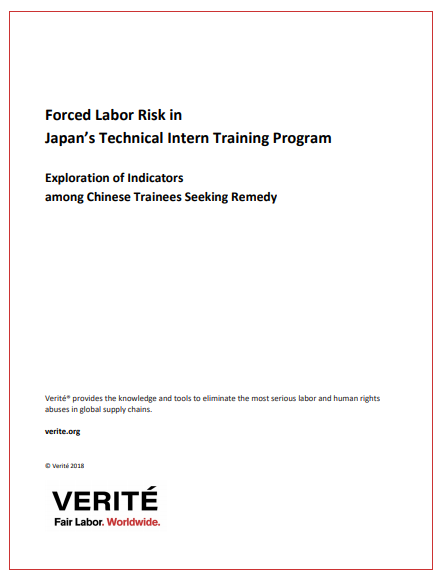A TITP trainee on a construction site was asked to be a scaffolder without safety training, suffered serious injury and was forced to continue working through his recovery. A trainee at a waste recycling plant was assigned work using dangerous equipment without proper training or protective gear. An agricultural trainee faced repeated verbal abuse that escalated to being beaten with a shovel.
Japan’s steadily declining native workforce has created a dependence on low-skilled foreign labour. This, in turn, has created a vulnerable foreign workforce at risk for suffering myriad labour abuses. Japan’s Technical Intern Training Program (TITP) attracts hundreds of thousands of workers each year, primarily from other Asian countries. From 2015 to 2017, Verité collected and analyzed testimonies of Chinese trainees in the TITP program who had submitted complaints to a local migrant advocacy organization. The findings are available in this paper.
The results of Verité’s analysis point to patterns of exploitation that entail elements of forced labour vulnerability. In addition to debt related to recruitment fees and/or deposits, some respondents also reported wage withholding and compulsory savings programs. It was also reported that some Japanese employers, at times in cooperation with Chinese recruiters, withheld up to 70 percent of trainees’ wages for “compulsory savings” that would be forfeited should trainees leave their positions prior to completion of three years in the TITP. Some trainees reported threats of violence and deportation for advocating for themselves or failing to meet employers’ demands. Finally, trainees also described wages that failed to reach even half of the minimum wage, working hours above legal limits, poor living conditions, and hazardous working conditions.
This exploration of previously documented labour violations among Chinese trainees was designed to provide an in-depth look at the experiences of trainees self-reporting problems in the program, as well as an analysis of potential vulnerability to specific indicators of forced labour. The findings are offered as a contribution to the understanding of the nature of exploitation in the TITP program where it occurs; and to help inform targeted interventions by government, business, and civil society in seeking to remedy exploitation experienced by trainees and prevent further abuse.

